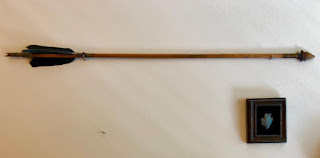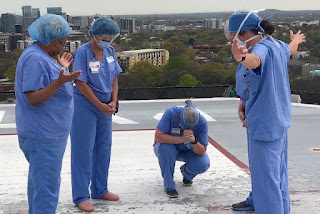Time Out Meme, Internet Domain
Reflecting truths, observations and lucky moments as they're encountered on life's journey.
Tuesday, April 21, 2020
DEJA VU TIME OUT
Labels:
DEJA VU,
INTROSPECTION,
QUARANTINING,
TIME OUT
Wednesday, April 15, 2020
DISTANT SOCIALIZING IN NATURE
NATIVE ARROWHEAD, Kansas Flint Hills
Ironically as I write this post, I’m joined by most of
the world this April 2020 as we shelter in place and social distance from one
another in hopes of slowing the COVID-19 viral pandemic. The virus primarily spreads as humans come in
close contact with one another by coughing, sneezing, hugging and shaking
hands. But there is no danger in venturing
outside by ourselves and experiencing the spirit of our creator on the winds.
As a youth, I loved to roam outside in the Kansas Flint
Hills amid the wind blowing unchallenged through the tall grass prairies and
along the rim rock edges of the grassy hills where grazing Herford cattle had
replaced wild buffalo. That experience nurtured
a new found love of the land that has stayed with me all my life. Many of these adventures included having a
shotgun over my shoulder in anticipation of the exploding rush of pheasants,
prairie chickens, ducks, and coveys of quail. I spied a flint arrowhead on the ground on one
outing that had possibly been launched by a lone kindred spirit onto the south
wind, flying on a feathered wooden shaft in pursuit of the same small wild game
that I was hunting. I always admired the
native Indians’ respect and stewardship for the land and their ritual of
offering up a prayer for the spirit that had given its life to sustain
theirs. Their existence was entirely
outside in nature, enabling them to relate to the oneness of the universe and possess
an acute appreciation for the gift of life.
These native people living in a rather pristine land had no
concern for pandemics. The diseases that
later decimated their tribes were carried and transmitted by intruders from across
the oceans. Those people had lived in
crowded areas during a period with no means to stop a pandemic from spreading. Fortunately, we have now evolved into a time
of scientific knowledge with the ability to develop vaccines and therapeutics
and even social apps like FaceTime and Zoom. And one of the best ways of coping with this
quarantine is to venture out into nature and distant socialize with our creator.
Friday, April 10, 2020
BLACK FRIDAY 2020
Empty Tomb, Israel
This world-wide 2020 pandemic has created empty hearts, empty rooms, empty offices, empty malls, empty theaters and even empty sanctuaries all across the land, enabling a contemplative time this Easter Sunday to focus on the personified hope of an empty tomb.
Sunday, April 5, 2020
APPRECIATING CAREGIVERS
Nurses awaiting helicopter, FaceBook
The current
coronavirus pandemic certainly has given all of us around the world a focus and
heightened appreciation for all of our caregivers in a multitude of specialties. And in this time of world-wide digital
communication we’re now in close touch with those on the battle fields fighting
for those stricken with the virus. Some
of them are saying that those that stay at home and do not facilitate the
movement of the virus are on the front lines and that they are behind the lines
caring for the patients that are seeking medical treatment.
Observing this
crisis unfold called to mind a response of the famous anthropologist Margaret
Mead when a student asked what she considered to be the first sign of
civilization in a culture. Excavations
of ancient sites have uncovered the remains of fire pits, flint stones used for
hunting and tools, clay shards, etc. But
she didn’t use any of these common examples.
Instead she replied that it was a healed thigh bone. She explained that in evolving cultures a
broken leg was a certain death sentence in the animal world. “Helping someone through a time of crisis is
where civilization starts”, she concluded.
Heroes aren’t
born. They’re created in times of strife
and struggle. We humans are hardwired
for empathy. And research has noted that
when we observe others suffering, our brains are stimulated so that we
experience the pain ourselves.
There’s a great
void between empathy and apathy. People
seem to have a range within which we can nurture either trait. Learning new skills will grow parts of our
brain for instance. Practicing
generosity, concern for strangers and others’ emotions grows our ability to
create a kinder world. And empathy is
primary in the caregiving profession. I
still remember a senior ICU nurse that came into my room around midnight after
major surgery and talked for quite a while to assure me that everything would
be OK.
But full time caring
for the sick and being witness to dying patients will take a toll on our
caregivers, demanding our own empathy for them.
I was witness to friends when the husband was terminally ill and
required a demanding amount of time and energy from his wife. She actually passed away before him. And our oncologist that worked tirelessly
with my wife to seek treatments for her metastasized breast cancer was said to
have a terrible bedside manner and lack of empathy. Once we spent time understanding his world,
we came to realize that we too would have to emotionally detach ourselves from
multiple patients with critical diseases for our own sanity. Nevertheless, when the end was near, he still
revealed his underlying humanity we had appreciated all along and for which I was
grateful.
Labels:
CAREGIVERS,
CIVILIZATION,
CIVILIZED,
CORONAVIRUS,
EMPATHY,
HUMANITY,
KINDNESS
Subscribe to:
Posts (Atom)



